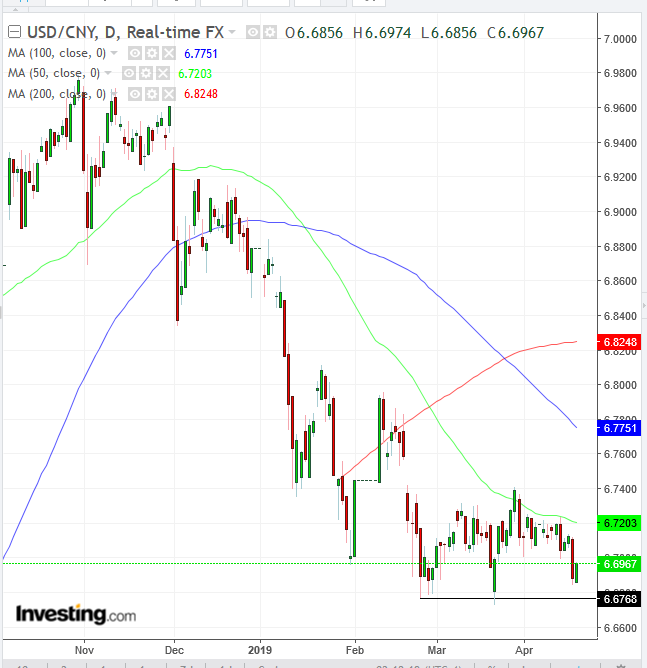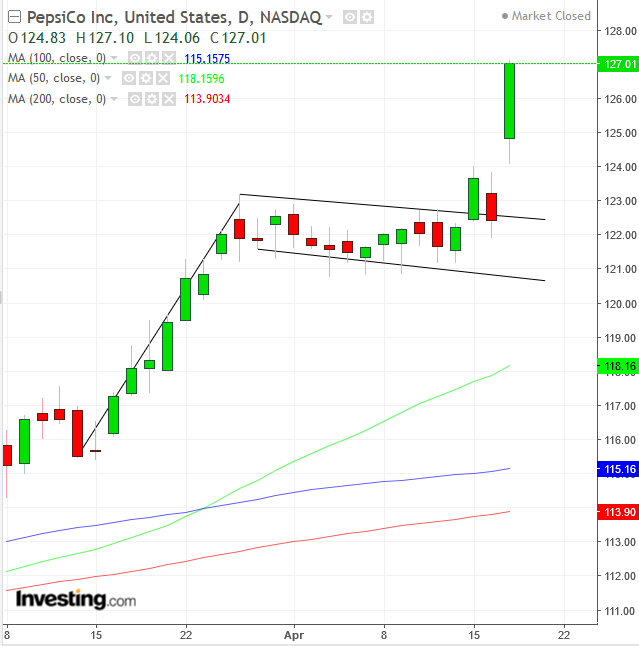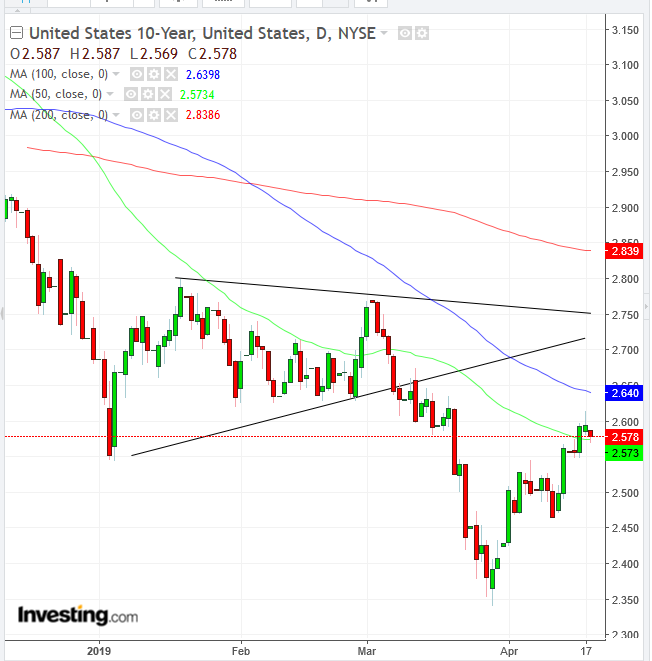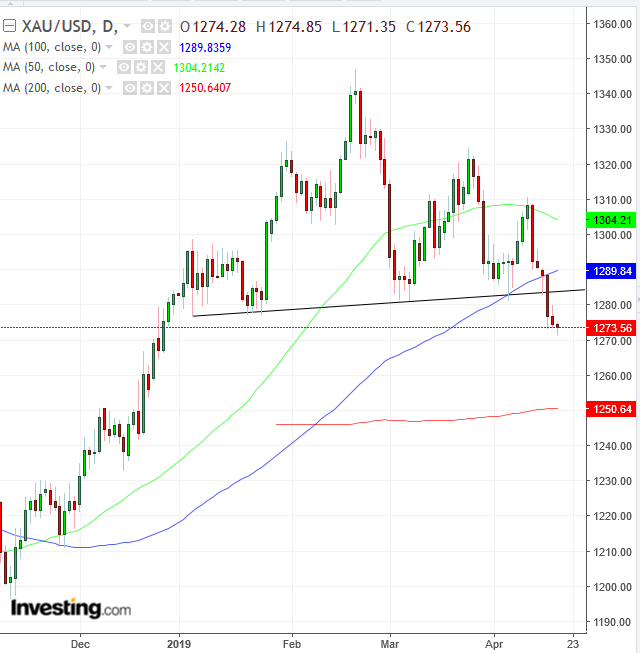- U.S. Futures point lower, Treasury yields wipe out gains on risk-off shift
- European shares rebound from German, French PMI fiasco; euro takes a hit
- Healthcare stock plunge weighs on U.S. indices, broader sentiment
- PepsiCo hits all-time high on earnings win, NASDAQ 100 seals price record on Qualcomm rally
- Stock markets in countries including the U.S., U.K. and Germany will be closed for Easter holidays on Friday.
-
- Honeywell (NYSE:HON) is also set to report on Thursday, with an EPS consensus of $1.83 EPS and $8.63 billion revenue. The group hasn't missed on either metric for the last eight quarters.
- The U.K.’s FTSE 100 fell less than 0.05%, the largest fall in a week.
- The MSCI Asia Pacific Index dropped 0.5%, the first retreat in a week.
- The MSCI Emerging Market Index slid 0.5%, the largest fall in a week.
- The Dollar Index rose 0.15%.
- The euro increased less than 0.05% to $1.1297.
- The Japanese yen climbed 0.1% to 111.90 per dollar, the strongest in a week.
- The yield on 10-year Treasurys slipped two basis points to 2.57%, the biggest dip in more than a week.
- Germany’s 10-year yield declined less than one basis point to 0.08%, the first retreat in more than a week.
- Britain’s 10-year yield dropped less than one basis point to 1.233%, the biggest dip in more than a week.
- Gold declined 0.1% to $1,272.82 an ounce, hitting the weakest in 16 weeks with its sixth consecutive decline.
- West Texas Intermediate crude fell 0.2% to $63.62 a barrel. Some analysts pointed out that varying forecasts from Wall Street banks often have too large of an impact on oil prices and recently worsened volatility in the market.
Key events
Futures on the S&P 500, Dow and NASDAQ 100 took their cue from falling Asian stocks this morning, as investors seemed to shift to risk-off ahead of the Good Friday's market pause.
Conversely, Europe's STOXX 600 managed to rebound from a lower open, while the euro continued to plunge after manufacturing PMI readings from Germany and France came short of expectations, re-igniting fears around the region's staggering growth rate.
In the earlier Asian session, regional shares fell back from multi-month highs, led by South Korea’s KOSPI (-1.43%) underperformance. The index's largest component, Samsung (KS:005930), weighed on the average price as the company took a hit from poor technical reviews on its new foldable phone, which was reported to suffer hefty screen malfunctions.

China’s Shanghai Composite (-0.4%) held relatively well compared with its regional peers, helped by the country's latest string of economic data beats as well as by a weak yuan—which benefits exports, especially amid a sensitive trading environment. Technically, the USD/CNY found support by a congestion low since late-Feb, though the pattern—a H&S continuation—suggests the pair is set to keep falling.
Australia’s S&P/ASX 200 fared as the session's outperformer, eking out a 0.05% gain.
Global Financial Affairs
On Wednesday, U.S. equities dropped to a weekly low on the back of a rout in the health care space, which took a beating from higher prospects of a U.S. policy shift to a public "single-payer" medical assistance system. Health Care stocks tumbled an aggregate 2.88% on the S&P 500, as UnitedHealth (NYSE:UNH), Anthem (NYSE:ANTM) and Humana (NYSE:HUM) all tumbled.
UnitedHealth's CEO David Wichmann in particular warned, during the company's earnings conference, that the "Medicare for All" proposal backed by Democratic representatives would squeeze profits in the industry and carry a severe impact on the broader economy and jobs. The selloff that ensued magnified the effect of other earnings reports, which had already dented investor sentiment this week by posting a mixed economic outlook.
Technically, the price of the SPX fell to 2,895 (-0.23%), but closed above the 2,900 psychological round number, marked by the April 8 resistance.
The Dow Jones Industrial Average slipped 0.01%, or 26 points, with Merck (NYSE:MRK) ranking as the index's heaviest faller (-4.69%).
The NASDAQ Composite retraced 0.05% from yesterday’s gains. Meanwhile, Qualcomm's (NASDAQ:QCOM)’s two-say 40% rally pulled the NASDAQ 100 0.34% higher, helping the index surpass its Aug. 29 record to close at 7680.72—though gains were tempered by a slump in biotech shares.
The Russell 2000 underperformed U.S. majors, slipping 0.95% lower. Technically, a fall below the 50 DMA would reduce the expectation of a peak higher than late the February's high, and with that, of a bottom to the December rout. On the other hand, a price dip below the 100 DMA would complete a double-top.

Morgan Stanley (NYSE:MS) rose, but a rout in Bank of New York Mellon (NYSE:BK) pushed financial shares lower. PepsiCo (NASDAQ:PEP) jumped to an all-time high after posting solid results, while CSX (NASDAQ:CSX) and Kansas City Southern (NYSE:KSU), which also beat earnings forecasts, lifted transportation stocks. IBM (NYSE:IBM) slumped as the IT group reported a drop in sales.

Meanwhile, the yield on 10-year Treasurys slipped for the first time in three days, after yesterday’s highs retreated from the 100 DMA, forming a shooting star. The price slid below the 50 DMA to then rebound above it.

Gold edged lower for the sixth consecutive day—even as the dollar also dropped for the last two sessions—completing a H&S top.
Overall, investors appear to be unwilling to commit to risk-on positions ahead of a long weekend, turning increasingly cautious compared to last Friday, when they helped markets close the week firmly higher. It would look like solid growth numbers from China, positive signals from trade talks and some upbeat corporate results failed to offset the mounting concerns over a disruption of the healthcare industry and its alleged implications for the U.S. economy.
The question is whether downbeat trading stems from fundamentals concerns or rather from investors' recent tendency to focus on negative headlines over positive ones, even as stocks returned to record highs—which would come as an omen for a market top. Perhaps their reaction to next week's earnings reports, which include results from Boeing (NYSE:BA) and Chipotle (NYSE:CMG), might provide us with some clues.
Up Ahead
Market Moves
Currencies
Bonds
Commodities
